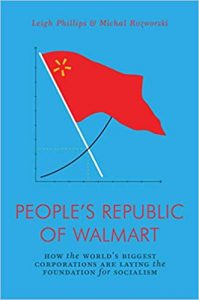One of the books I’ve read on this trip to the AEA/ASSA meetings in San Diego is The People’s Republic of Walmart by Leigh Phillips and Michael Rosworski. This is a very entertaining projection of the socialist calculation debate onto modern capitalism.
 The starting point is the Simon/Coase realisation that big firms are internally planned economies – if it works for Walmart, why wouldn’t it work at larger scale? The authors’ hypothesis is that economic planning might work better now that we have so much more powerful computers and better data.
The starting point is the Simon/Coase realisation that big firms are internally planned economies – if it works for Walmart, why wouldn’t it work at larger scale? The authors’ hypothesis is that economic planning might work better now that we have so much more powerful computers and better data.
I’d recommend the book as an introduction to the socialist calculation debate for those unfamiliar with it (ideal for students). It cites some of my favourite books including Francis Spufford’s Red Plenty and Eden Medina’s Cybernetic Revolutionaries. Some chilling lines – about Stalin’s purges, for instance: “Anyone with any expertise was placed under suspicion.” It’s a great read.
Am I persuaded? Not entirely. Technology clearly will change organisational configurations, but it has just as much been decentralisation of firms and extended supply chains as it has been giant Walmart-type firms. I’m also sceptical that the data available is actually the information needed to plan an economy, or that it’s easy to access and join up. Still, it’s the right question, and a reminder that the boundary between market, state and other forms of organistaion is not set in stone but needs constant negotiation – in fact, I know a great book about this about to be published: Markets, State and People.
 As seen at ASSA2020 in San Diego
As seen at ASSA2020 in San Diego
